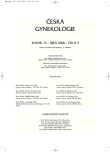Long-term Low Molecular Weight Heparin Protection during Pregnancy for the Recurrent Fetal Loss
Authors:
Z. Hajšmanová 1; J. Šlechtová 1; P. Šigutová 1; Z. Ulčová-Gallová 2
Authors‘ workplace:
ÚKBH FN a LF UK, Plzeň, přednosta prof. MUDr. J. Racek, DrSc.
1; Gynekologicko-porodnická klinika FN, Plzeň, přednosta doc. MUDr. Z. Rokyta, CSc.
2
Published in:
Ceska Gynekol 2008; 73(5): 278-283
Category:
Original Article
Overview
Recurrent fetal loss affects 1 to 5% women of the fertile age all over the world. Pathogenesis of recurrent early or late fetal loss remains unclear and therefore the LMHW administration during pregnancy has not been sorted out so far.
Our trial deals with a cohort of 51 pregnant women with recurrent fetal loss in their personal history treated by long-term administration of LMWHs which was compared with a cohort of healthy women LMWHs untreated.
91% effectiveness of a long-term LMWH protection means in fact 43 liveborn babies delivered without any complications during pregnancy and delivery to 47 women - 30 of these women were primiparas.
Key words:
recurrent fetal loss, low molecular weight heparin, pregnancy and delivery.
Sources
1. Brenner, B. Thrombophilia and pregnancy loss in first intended pregnancy. J Thromb Haemost, 2005, 3, p. 2176–2177.
2. Brenner, B. Antithrombotic prophylaxis for women with thrombophilia and pregnancy complications – Yes. J Thromb Haemost, 2003, 1, p. 2070–2072.
3. Brenner, B. Maternal anticoagulant prophylaxis for prevention of pregnancy loss in women with trombophilia. J Thromb Haemost, 2003, 1, p. 416–417.
4. Brenner, B., Hoffman, R., Carp, H., et al. for the LIVE - ENOX investigators. J Thromb Haemost, 2005, 3, p. 227–229.
5. Carp, H., Dolitzky, M., Inbal, A. Thromboprophylaxis improves the live birth rate in women with consecutive recurrent miscarriages and hereditary thrombophilia. J Thromb Haemost, 2003, 1, p. 433–438.
6. De Groot, PD., Derksent, RHWM. Pathophysiology of the antiphospholipid syndrome. J Thromb Haemost, 2005, 3, p. 1854–1860.
7. Gris, JC., Mares, P. The long and winding road towards LMWH for pregnacy loss. J Thromb Haemost, 2005, 3, p. 224–226.
8. Gris, JC., et al. Low-molecular-weight heparin versus low dose aspirin in women with one fetal loss and a constitutional thrombophilic disorder. Blood, 2004, 103, 10, p. 3695–3699.
9. Jenšovský, K. Konference o sekundární osteoporóze. Plzeň, duben 2008.
10. Levi, M. All heparins are equal, but some are more equal than others. J Thromb Haemost, 2003, 1, p. 884–885.
11. Lindquist, PG. Low molecular weight heparin for repeated pregnancy loss: is it based on solid evidence? J Thromb Haemost, 2003, 3, p. 221–223.
12. Middeldorp, S. Thrombophilia and pregnancy complications: cause of association? J Thromb Haemost, 2007, 5 (Suppl. 1), p. 276-282.
13. Pabinger, I., Grafenhofer, H., Kaider, A., et al. Risk of pregnancy-associated recurrent venous thromboembolism in women with a history of venous thrombosis. J Thromb Haemost, 2005, 3, p. 949–954.
14. Rey, E., David, M. Fetal loss, thrombophilia and heparin:the clinician’s dilemma. J Thromb Haemost, 2005, 3, p. 782–783.
15. Walker, D. The use of LMWH in pregnacies at risk: new evidence or perception? J Thromb Haemost, 2005, 3, p. 778–793.
16. Salmon, JE. Are heparins effective in some patiens with recurrent pregancy loss because they inhibit complement activation? J Thromb Haemost, 2005, 3, p. 783–784.
17. Seventh ACCP Consensus Conference on Antithrombotic Therapy. Bates, SM., Greer, IA., Hirsch, J., Ginsberg, JS. Use of antithrombotic agents during pregnancy. Chest, 2004, 126, p. 627S - 644S.
18. Ulcova-Gallova. Z., Krauz, V., Novakova, P., et al. Anti - phospholipid antibodies against phosphatidylinositol, and phosphatidylserine are more significant in reproductive failure than antibodies against cardiolipin only. Amer J Reprod Immunol, 54, 2005, s. 112–117.
19. Ulčová-Gallová, Z. Neplodnost – útok imunity. Praha: Grada, 2006, s. 144.
Labels
Paediatric gynaecology Gynaecology and obstetrics Reproduction medicineArticle was published in
Czech Gynaecology

2008 Issue 5
Most read in this issue
- Long-term Low Molecular Weight Heparin Protection during Pregnancy for the Recurrent Fetal Loss
- Myoms, Fertility and Pregnancy
- Caesarean Section – Indication or Choice?
- Vaginal and Postpregnancy Inflamations, Risks of their Treatment for Fetus
